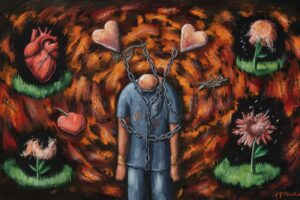What are the 8-Signs of Emotional Exploitation?
Emotional exploitation is a deeply harmful form of manipulation that can have lasting effects on an individual’s well-being and sense of self-worth.
In relationships where one party seeks to control, manipulate, or emotionally abuse another, the dynamics of power and control can be subtle yet devastating. Understanding the signs and tactics of emotional exploitation is crucial for recognizing and addressing this harmful behavior.
In this article, we will explore the various aspects of emotional exploitation, from defining what it entails to identifying common tactics used by manipulators.
By shedding light on the impact of emotional exploitation on victims and providing strategies for coping and seeking help, we aim to empower individuals to protect themselves and navigate relationships more effectively.

Table of Contents
ToggleIntroduction to Emotional Exploitation
Emotional exploitation refers to the manipulation and misuse of someone’s emotions for personal gain or satisfaction. This type of manipulation can come in various forms, such as gaslighting, guilt-tripping, or emotional blackmail.
It often involves the perpetrator taking advantage of the victim’s vulnerabilities and insecurities to control or influence their behavior. Emotional exploitation can occur in various relationships, including romantic partnerships, friendships, and even within families.
One of the key characteristics of emotional exploitation is the imbalance of power between the perpetrator and the victim. The perpetrator may use their perceived authority or influence over the victim to manipulate their emotions and behaviors.
This imbalance can make it difficult for the victim to recognize and address the manipulation, as they may feel dependent on the perpetrator for validation or support. Over time, emotional exploitation can erode the victim’s sense of self-worth and autonomy, leading to long-lasting psychological harm.
In order to protect oneself from emotional exploitation, it is important to establish boundaries and communicate openly with others about one’s feelings and needs. Recognizing the signs of emotional manipulation, such as feeling constantly guilt-tripped or invalidated, is also crucial in preventing further harm.
Seeking support from trusted friends, family members, or mental health professionals can provide validation and guidance in navigating challenging relationships.
Ultimately, fostering self-confidence and self-awareness can help individuals stand up against emotional exploitation and cultivate healthier, more authentic connections with others.
Read more about “What Does Love Bombing Mean and ways to overcome?”
How Emotional Exploitation Impacts Individuals?
Emotional exploitation refers to the manipulation and abuse of an individual’s emotions for personal gain. This type of exploitation can have devastating effects on the individual’s mental and emotional well-being. Those who are emotionally exploited may experience feelings of insecurity, low self-worth, and anxiety.
These negative emotions can lead to a cycle of self-doubt and fear, as the individual becomes increasingly dependent on the exploiter for validation and approval. This can ultimately result in the individual losing touch with their own emotions and sense of self.
Furthermore, emotional exploitation can also impact an individual’s relationships and social interactions. Those who have been emotionally exploited may struggle to trust others and form healthy connections.

They may find it difficult to express their own emotions or set boundaries in relationships, leading to further feelings of isolation and vulnerability.
This can create a negative feedback loop where the individual becomes increasingly isolated and dependent on the exploiter for emotional support, perpetuating the cycle of exploitation.
In conclusion, emotional exploitation can have serious consequences for individuals, impacting their mental health, relationships, and overall sense of well-being.
It is important for individuals to recognize the signs of emotional exploitation and seek support from trusted friends, family members, or mental health professionals.
By addressing these feelings of manipulation and working towards building healthy boundaries and self-esteem, individuals can begin to reclaim their emotional autonomy and rebuild positive connections with others.
Read more about “How to Safeguard Yourself from Toxic Relationships?”
Types of Emotional Manipulation
Emotional manipulation is a complex and insidious form of psychological control that can have destructive effects on relationships and mental well-being.
One common type of emotional manipulation is gaslighting, where the manipulator distorts the victim’s sense of reality by denying their experiences or feelings, making the victim question their own sanity and perception of events.
Gaslighting often involves subtle tactics such as twisting facts, shifting blame, and invalidating emotions, which can lead the victim to doubt themselves and become dependent on the manipulator for validation.

Another type of emotional manipulation is guilt-tripping, where the manipulator uses guilt as a tool to manipulate the victim into behaving in a certain way or meeting their needs.
This can involve overt tactics such as making the victim feel responsible for the manipulator’s emotions or actions, or more covert tactics such as playing the victim themselves to elicit sympathy and compliance.
Guilt-tripping can be especially damaging as it can erode the victim’s sense of self-worth and lead to a cycle of toxic behavior in the relationship.
Overall, understanding the different types of emotional manipulation is crucial in recognizing and protecting oneself from manipulative individuals, and seeking support from trusted sources can help in breaking free from their control.
Read more about “How to Identify Seductive Emotional Manipulation?”
Effects of Emotional Exploitation on Victims
Victims of emotional exploitation often experience profound effects on their mental and emotional well-being. One of the primary consequences of emotional exploitation is the erosion of the victim’s self-esteem and confidence.
Constant criticism, gaslighting, and manipulation can cause the victim to doubt their own feelings, thoughts, and perceptions, leading to a sense of worthlessness and inadequacy.
This can result in feelings of depression, anxiety, and even post-traumatic stress disorder, as the victim struggles to make sense of the emotional abuse they have endured.
Furthermore, emotional exploitation can have long-lasting effects on the victim’s ability to form and maintain healthy relationships. The trauma of emotional exploitation can make it difficult for the victim to trust others, express their emotions, and establish boundaries.
This can lead to isolation, loneliness, and a fear of intimacy, as the victim struggles to protect themselves from further emotional harm.
In extreme cases, victims of emotional exploitation may develop a pattern of seeking out abusive relationships, as they have become conditioned to believe that this type of treatment is normal and acceptable.
Read more about “How to Evaluate a Narcissist Partner Behavior?”
Overall, the effects of emotional exploitation on victims are profound and far-reaching, impacting every aspect of their lives and hindering their ability to heal and move forward.

8-Signs of Emotional Exploitation
1) Manipulative behavior aimed at controlling emotions and actions
Manipulative behavior aimed at controlling emotions and actions is a troubling aspect of human interaction that can have destructive consequences on individuals and relationships.
Individuals who exhibit manipulative behavior often use tactics such as guilt-tripping, gaslighting, and emotional blackmail to assert dominance and control over others.
This type of behavior is usually driven by a need for power and validation, as manipulators often lack the ability to forge genuine connections and healthy relationships.
By manipulating the emotions and actions of others, these individuals seek to maintain a sense of control and gratification at the expense of the well-being and autonomy of those around them.
In order to combat manipulative behavior, it is essential for individuals to recognize and address the underlying issues that drive this destructive behavior.
This may involve seeking therapy or counseling to work through emotional issues and learn healthy ways of communicating and relating to others.
It is also important for individuals to establish boundaries and assert their own needs and priorities in relationships, in order to prevent manipulators from taking advantage of their vulnerabilities.
By fostering self-awareness and practicing assertiveness, individuals can protect themselves from being manipulated and create healthier and more fulfilling relationships built on trust and respect.
2) Gaslighting tactics to make victims doubt their own feelings
Gaslighting is a form of psychological manipulation that seeks to make victims doubt their own feelings, perceptions, and reality. This insidious tactic is often used by abusers to gain power and control over their victims.
Gaslighting can take many forms, such as trivializing the victim’s feelings and experiences, denying the validity of their emotions, or even outright lying about past events.
By undermining the victim’s confidence in their own thoughts and emotions, gaslighters are able to maintain control and perpetuate an abusive dynamic.
Victims of gaslighting may find themselves constantly second-guessing their own feelings and experiences, leading to confusion and self-doubt. Experiencing this can have a negative impact on their mental well-being.

Gaslighting tactics can be subtle and difficult to detect, making it even harder for victims to recognize and break free from the cycle of manipulation.
It is important for individuals to educate themselves about gaslighting tactics and seek support from trusted friends, family members, or mental health professionals if they suspect they are being manipulated in this way.
By raising awareness about gaslighting and its harmful effects, we can work towards creating a safer and more supportive environment for victims of psychological abuse.
3) Isolation From Friends and Family to Maintain Control
Isolation from friends and family can be a tactic used by individuals seeking to maintain control over others. By cutting off a person from their support system, the individual in control can manipulate and influence them more easily.
Isolation can lead to a sense of dependency on the controlling individual, as the victim may have no one else to turn to for emotional support or guidance.
This can create a power dynamic where the isolated individual becomes more susceptible to the control and influence of the perpetrator. In extreme cases, it can prevent the victim from seeking help or escaping the abusive situation due to feelings of isolation and powerlessness.
Furthermore, isolation can also serve to reinforce the control and dominance of the individual in power. By severing the victim’s ties to friends and family, the perpetrator can create a narrative where they are the only source of support and validation for the victim.
This can lead to a cycle of emotional dependency and manipulation, as the victim becomes increasingly reliant on the perpetrator for their emotional needs.
In this way, isolation can be a powerful tool for maintaining control over others, as it can create a sense of powerlessness and helplessness in the victim, making it harder for them to break free from the oppressive influence of the controller.
4) Constant Criticism and Belittling of the Victims Worth
Constant criticism and belittling of a victim’s worth can have detrimental effects on their mental and emotional well-being. When individuals are repeatedly put down and devalued, it can lead to feelings of inadequacy, low self-esteem, and a diminished sense of self-worth.
This type of negative reinforcement can create a cycle of self-doubt and self-criticism, which can be difficult to break out of without proper support and intervention.
Moreover, constant criticism and belittling can also perpetuate a culture of victim-blaming and perpetuate feelings of shame and guilt. When victims are constantly told that they are not good enough or deserving of respect and dignity, it can be difficult for them to speak up and seek help.
This can further isolate victims and prevent them from getting the assistance and resources they need to heal and recover from the harm they have experienced.
It is important for individuals to recognize the impact of their words and actions on others and to strive to create a supportive and empathetic environment that promotes healing and resilience.
5) Withholding Affection or Love as a Form of Punishment
Withholding affection or love as a form of punishment can have detrimental effects on an individual’s psychological well-being. Research in developmental psychology has shown that consistent loving and supportive interactions between caregivers and children are essential for healthy emotional development.
When affection is suddenly withdrawn in response to a perceived wrongdoing, it can create feelings of rejection, abandonment, and low self-worth.
This form of punishment can also lead to the development of maladaptive coping mechanisms, such as seeking approval from others or engaging in self-destructive behaviors to fill the void left by the absence of affection.
In extreme cases, chronic withholding of love can result in long-term emotional scars and difficulties forming healthy relationships in the future.
Furthermore, using affection as a tool for punishment can perpetuate a cycle of ineffective discipline and strained relationships.
When individuals experience love and affection as conditional based on their behavior, they may begin to associate receiving love with meeting certain expectations or requirements.
This can lead to feelings of insecurity, anxiety, and an inability to express their emotions authentically. Additionally, the use of withholding affection as a means of control can erode trust and communication within relationships, creating a dynamic of fear and resentment rather than mutual respect and understanding.
Overall, it is essential to recognize the damaging effects of using affection as a form of punishment and instead promote healthy and constructive ways of addressing behavioral issues and fostering positive emotional connections.
6) Exploiting Vulnerabilities for Personal Gain or Power
7) Ignoring Boundaries and Disregarding Personal Autonomy
When boundaries are ignored, individuals may feel disrespected, undervalued, or violated. This can lead to feelings of powerlessness or a loss of control over one’s own life.
Similarly, when personal autonomy is disregarded, individuals may feel as though their choices and decisions are not being respected, leading to frustration, resentment, and a sense of being unacknowledged.
In relationships, ignoring boundaries and disregarding personal autonomy can create a toxic and unhealthy dynamic, as it can undermine trust and communication, and erode the foundation of mutual respect and understanding.
In order to address the issue of ignoring boundaries and disregarding personal autonomy, it is crucial for individuals to recognize and understand the importance of respecting and valuing the boundaries and autonomy of others.
This requires self-awareness, empathy, and effective communication skills. It is important to actively listen to others, to seek consent and permission before taking action, and to consider the impact of one’s behaviors on others.
By fostering a culture of mutual respect, understanding, and empathy, individuals can work towards creating healthier relationships and communities where boundaries are honored, and personal autonomy is valued and respected.
Ultimately, by recognizing the significance of boundaries and personal autonomy, individuals can empower themselves and others to lead more fulfilling and authentic lives.
8) Guilt-tripping and Emotional Blackmail to Manipulate Behavior
Guilt-tripping and emotional blackmail are manipulative tactics used to control behavior by eliciting feelings of shame, remorse, or fear in others.
These tactics are often used in interpersonal relationships, such as between partners, parents and children, or friends, to get one’s way or to control the actions of others. This form of manipulation is detrimental to healthy relationships as it undermines trust, communication, and mutual respect.
Individuals who employ guilt-tripping and emotional blackmail often do so to satisfy their own needs or desires, rather than considering the feelings and autonomy of others.
They may use tactics such as threatening self-harm, withdrawal of affection, or playing the victim in order to manipulate others into complying with their wishes.
This can lead to increased feelings of resentment, anger, and mistrust in the relationship, as the manipulated party may feel used, disrespected, or controlled.
It is important for individuals to recognize these manipulative behaviors in relationships and set boundaries to protect themselves from emotional harm and maintain healthy boundaries.

Empowering Yourself Against Emotional Exploitation
To empower oneself against emotional exploitation, one must first recognize and acknowledge the signs of manipulation, such as guilt-tripping, gaslighting, and emotional blackmail.
Setting clear boundaries and communicating assertively is crucial in asserting one’s autonomy and protecting oneself from emotional manipulation. Developing self-awareness and self-esteem is also key in resisting manipulation, as individuals who are confident in their worth are less likely to be swayed by others’ attempts to control them.
Additionally, seeking support from friends, family, or a therapist can provide validation and guidance in navigating difficult relationships and standing up against emotional exploitation.
By cultivating a strong sense of self and assertiveness, individuals can reclaim their power and protect themselves from emotional exploitation.
Seeking Help for Emotional Exploitation
Seeking help for emotional exploitation is crucial in maintaining mental and emotional well-being. Individuals who find themselves in situations where their emotions are being manipulated or taken advantage of often experience feelings of confusion, guilt, and powerlessness.

By reaching out to a therapist or counselor, individuals can gain a better understanding of the dynamics at play in their relationships and develop strategies to assert boundaries and protect their emotional health.
Additionally, therapy can help individuals recognize and process their own emotions, building resilience and self-awareness. Seeking help for emotional exploitation is a powerful act of self-care and empowerment, allowing individuals to break free from toxic patterns and cultivate healthier, more fulfilling relationships.
Strategies for Coping with Emotional Exploitation
Emotional exploitation is a manipulative tactic often used by individuals to take advantage of someone’s emotions for their own benefit. It can leave the victim feeling drained, manipulated, and powerless.
In order to cope with emotional exploitation, it is important to first recognize the signs of manipulation and set boundaries with the individual perpetuating the exploitation.
This may involve assertively communicating boundaries and consequences for crossing them, as well as seeking support from trusted friends or mental health professionals. By creating a supportive network and asserting boundaries, individuals can begin to take back control of their emotions and protect themselves from further exploitation.
Additionally, developing healthy coping mechanisms and self-care practices can be instrumental in navigating and healing from emotional exploitation. This may involve practices such as mindfulness, meditation, journaling, and therapy to process and release trapped emotions.

Engaging in activities that promote self-love and self-compassion can also help build resilience and self-esteem in the face of emotional manipulation. Ultimately, by fostering self-awareness, setting boundaries, and prioritizing self-care, individuals can begin to heal from emotional exploitation and reclaim their emotional autonomy.
Conclusion:
In conclusion, recognizing and addressing emotional exploitation is essential for maintaining healthy relationships and protecting one’s emotional health. By being aware of the signs, understanding the tactics employed by manipulators, and seeking support when needed, individuals can empower themselves to break free from the cycle of exploitation.
Remember, you deserve to be treated with respect and kindness, and advocating for your emotional well-being is a crucial step towards living a fulfilling and authentic life.
FREQUENTLY ASKED QUESTIONS
1. What are some common tactics used in emotional exploitation?
Some common tactics used in emotional exploitation include guilt-tripping, gaslighting, and manipulation. Guilt-tripping involves making someone feel responsible for their actions or decisions, even when they are not at fault. Gaslighting is a form of psychological manipulation that seeks to make the victim doubt their own perceptions and reality.
Manipulation is when someone uses deception or trickery to control another person’s thoughts or actions for their own benefit. These tactics can be detrimental to the victim’s mental and emotional well-being, leading to feelings of confusion, self-doubt, and low self-esteem. It is essential for individuals to recognize these tactics and set boundaries to protect themselves from emotional exploitation in professional settings.
2. How can I differentiate between healthy relationship dynamics and emotional exploitation?
Differentiating between healthy relationship dynamics and emotional exploitation requires a nuanced understanding of power dynamics, communication patterns, and individual boundaries. In a healthy relationship, there is mutual respect, trust, and support between partners.
There is open and honest communication, with each person feeling heard and valued. Boundaries are respected, and both individuals feel free to express their thoughts and feelings without fear of judgment or manipulation. On the other hand, emotional exploitation involves one person using tactics such as guilt-tripping, gaslighting, or manipulation to control the other’s emotions or behavior for their own benefit.
Emotional exploitation may show up signs as confusion, anxiety, or feelings of worthlessness. It is important to be mindful of these red flags and seek support from trusted friends or professionals if you suspect that you are being emotionally exploited in a relationship.
3. Where can I seek help if I suspect I am being emotionally exploited?
If you suspect that you are being emotionally exploited, one of the first steps to take in seeking help is to reach out to a licensed mental health professional. This could be a therapist, counselor, or psychologist who specializes in emotional abuse and manipulation. They can provide you with a safe space to discuss your concerns, validate your feelings, and offer guidance on how to address the situation effectively.
If you are going through emotional exploitation, seeking help from organizations that specialize in assisting victims, such as domestic violence hotlines or abuse survivor centers, can offer personalized assistance and resources to help address your individual requirements. Seeking help from professionals who are trained in recognizing and addressing emotional exploitation is crucial in protecting yourself and taking steps towards healing and empowerment.


